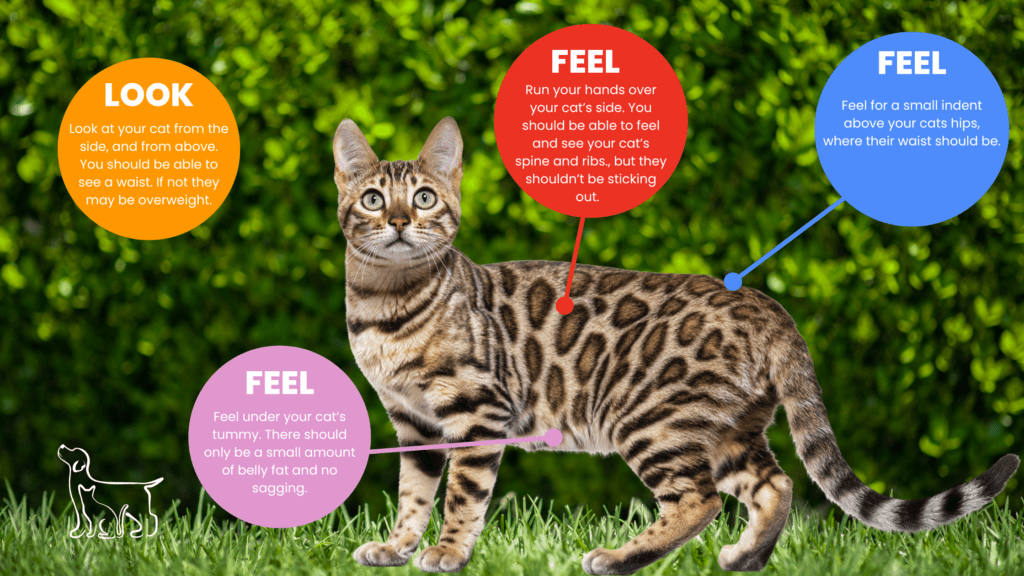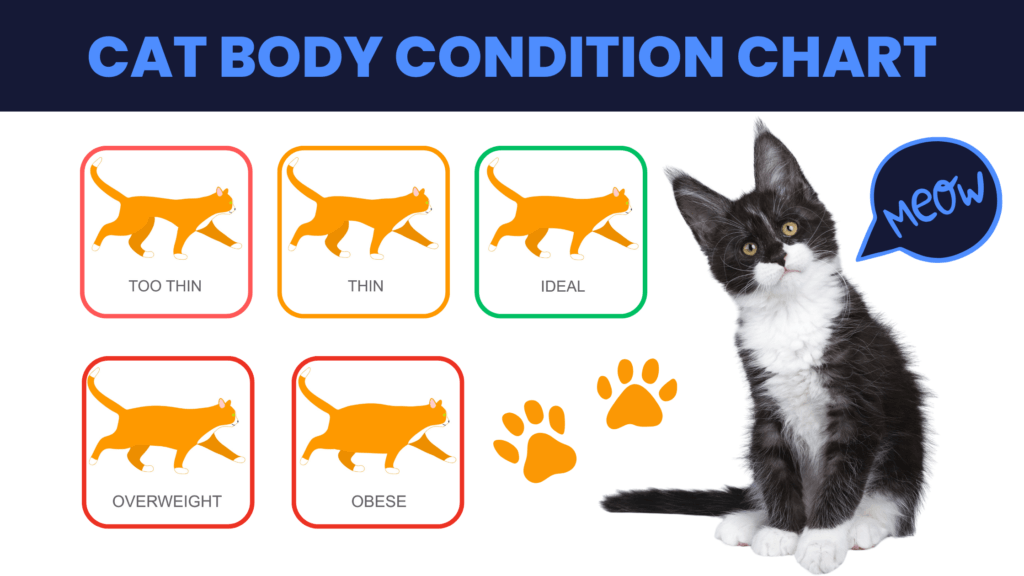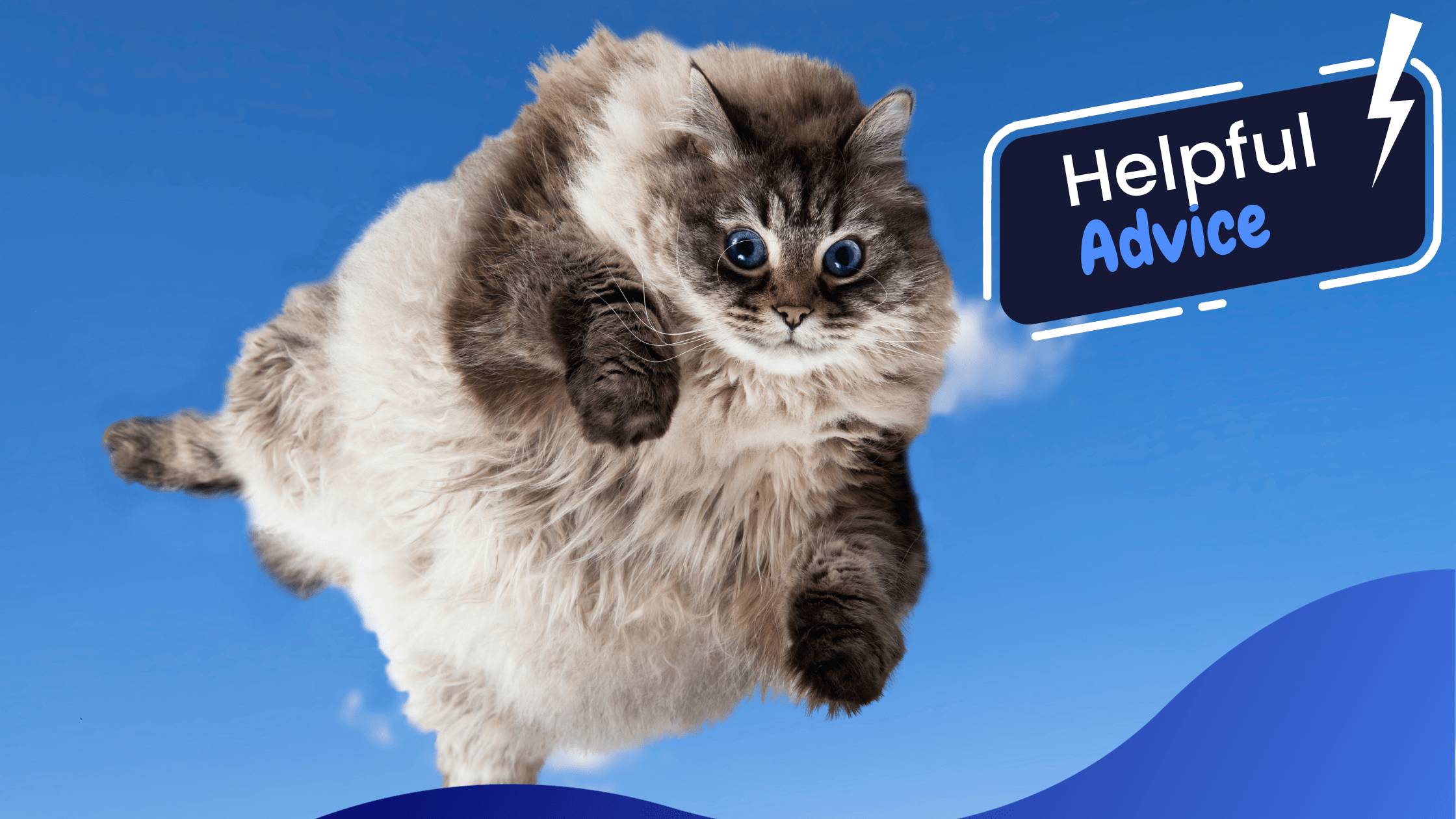Vets estimate that nearly 43% of cats in the UK are overweight or obese. Being obese puts your pets at risk of health problems, and is likely to reduce how long they live.
Obesity occurs when your pet has too much body fat and this negatively affects their health, well-being, and quality of life. We believe that obesity is a serious welfare issue in pets, as it can cause extreme suffering and disability. It can also affect your pet’s ability to perform normal activities, such as exercising.
Is my Cat overweight?
The best way to assess your dog is to look at their shape, their weight may fluctuate throughout life, but their ideal shape stays the same.

Look at your cat’s waistline
- Look down at your cat from directly above while he or she is standing. Look for a small indent above your cat’s hips, where their waist should be (this can be a bit tricky with long-haired cats). If you can’t see their waist or their sides are bulging, your cat is probably overweight.
Feel for your cat’s ribs
- When your cat is at a healthy weight you should be able to slightly feel their ribs by gently running your hand along their chest. If you can’t feel your cat’s ribs, your cat may be overweight.
Struggling to jump
- Cats are born with the ability to run and jump quickly. If your cat takes several tries to jump up onto their favorite piece of furniture, or if they give up entirely, their weight could be the issue.
Cat Obesity Chart

Why Is My Cat Overweight?
Diet and Exercise
The majority of cats are simply consuming too much food and not enough exercise.
Every pet food offers a feeding guide for the amount of food per day by the weight of your pet.
A little exercise can make a big difference for your pet and might make your relationship together a little healthier as well.
Medical
It is rare for obesity in cats to be caused by a medical problem. However, if your cat’s activity has slowed due to an illness such as heart disease, lung disease or arthritis, he may tend to gain weight. Always have your cat examined if you suspect your cat is gaining weight due to a health problem.
Pregnancy
If you have an unneutered female cat that could have had access to a male, it’s important to rule out pregnancy as a cause of their weight gain.
What Are The Health Risks?
Diabetes
Obese cats are at a much higher risk of developing diabetes: 80 to 90% of obese cats have the disease and require daily insulin injections. Usually, diabetes can be cured after losing all excess weight, because the accumulated fat that directly causes the loss of glucose regulation is no longer present.
Compromised Immune System
Cats’ immune systems can be compromised when they are obese, making them more susceptible to infections. This includes urinary infections and “stones” which occur when overweight cats are less active, tend to drink less water, and urinate less than healthy cats.
Liver Failure
Liver failure poses a serious and potentially fatal risk in obese cats. When a cat’s body feels malnourished – for example, if a constant supply of food is no longer available – fat is moved from storage to the liver to be used for energy. However, the cat’s body cannot effectively handle this process leading to poor liver function, sometimes leading to fatal liver failure and liver failure.
Grooming
With extra weight, cats find it difficult to groom themselves which can lead to skin problems. Similarly, extra weight puts pressure on your cat’s joints and they can suffer from arthritis. Cardiovascular and respiratory systems are also affected, leading to breathlessness and heart problems.
Mental Health
An overweight or obese cat may also experience mental health problems; Instead of running away or hiding when they sense danger, overweight cats cannot react quickly and therefore cannot follow their instincts, which can make them miserable.
With the right diet, exercise, and behaviours, you’ll be able to protect your cat from the risks of being overweight or obese.
Thank You for reading, until next time…

